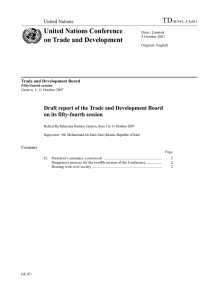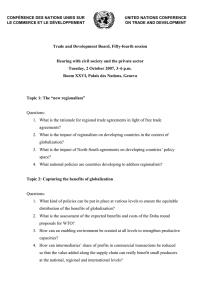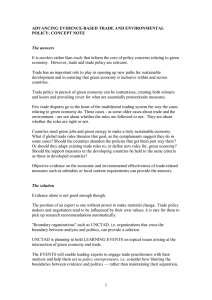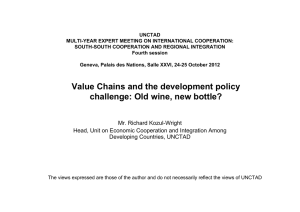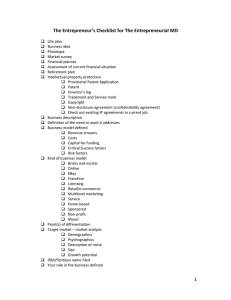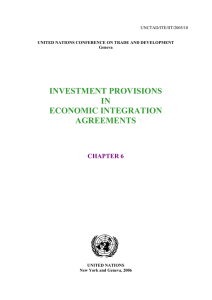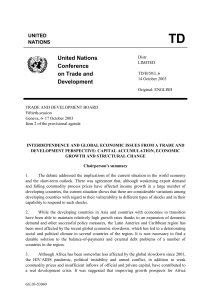TD United Nations Conference on Trade and Development
advertisement
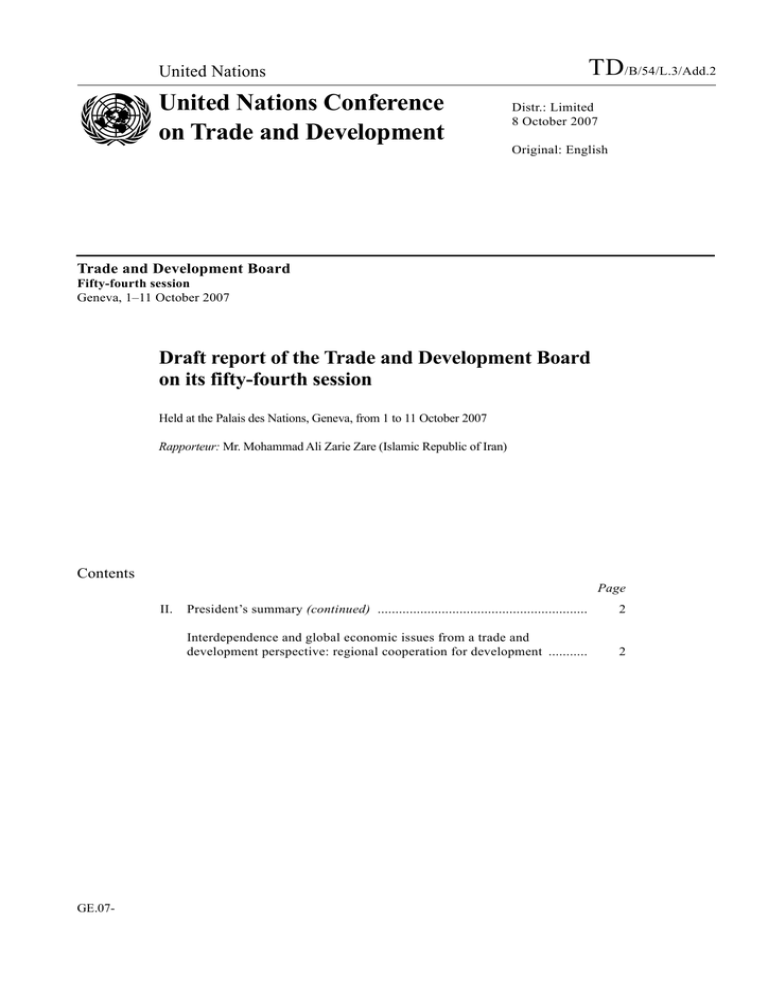
TD/B/54/L.3/Add.2 United Nations United Nations Conference on Trade and Development Distr.: Limited 8 October 2007 Original: English Trade and Development Board Fifty-fourth session Geneva, 1–11 October 2007 Draft report of the Trade and Development Board on its fifty-fourth session Held at the Palais des Nations, Geneva, from 1 to 11 October 2007 Rapporteur: Mr. Mohammad Ali Zarie Zare (Islamic Republic of Iran) Contents Page II. GE.07- President’s summary (continued) ........................................................... 2 Interdependence and global economic issues from a trade and development perspective: regional cooperation for development ........... 2 TD/B/54/L.3/Add.2 II. President’s summary (continued)1 Interdependence and global economic issues from a trade and development perspective: regional cooperation for development 1. Delegations welcomed the Trade and Development Report, 2007 as an important and comprehensive effort to analyse regional integration and as a key contribution to the debate on regional cooperation for development. It provided a rational and timely analysis, as well as pragmatic and development-oriented policy options, and addressed the key issues in the relationship between globalization, regionalism and development. 2. It was pointed out that, despite the recent favourable global economic environment, there were still serious problems of inequality, social exclusion and volatile growth in some regions, and progress towards the Millennium Development Goals was difficult. The challenge was to translate recent improvements in growth performance into long-term progress. Recent financial instability had shown the fragilities of the global financial system. The risks posed by global imbalances also raised concerns. A more stable global environment should be fostered through greater systemic coherence and macroeconomic policy coordination. Regional financial cooperation could help deal with shortcomings in the international financial system. 3. The topic of the “new regionalism” generated a lively debate. There was disagreement on some of the conclusions in the report, including on how comprehensive North-South free trade agreements should be – particularly with regard to public procurement and investment – and on the regulatory framework. Some delegations noted the need for caution and a careful evaluation of the benefits, in terms of trade and foreign direct investment, and the costs, in terms of loss of policy space, of such agreements for developing countries. Free trade agreements should pay sufficient attention to development needs. Other delegations disagreed with the analysis on the impact of those agreements, suggesting they did not threaten the coherence of the multilateral trading system but in fact promoted faster and deeper integration, opened markets, provided skill and knowledge gains, and promoted the necessary economic and regulatory reforms. In their view, the agreements should be deeper, wider and more comprehensive. One delegation expressed disagreement with the report’s analysis of the North American Free Trade Agreement, citing methodological concerns. 4. There was broad agreement that regional integration, which was the result of complex historical, cultural and economic factors, could have positive implications for participating countries. It was particularly important considering the current state of the negotiations in the World Trade Organization (WTO). Regional cooperation was a central element that had the potential to support national development strategies in developing countries and help them better integrate into the global economy. It could foster development by promoting investment, innovation and productive transformation in developing countries, as well as contribute to regional stability and security. It also implied the provision of regional public goods and the creation of regional economic spaces, which could widen the policy options open to developing countries. Regional integration should be adapted to the specific situations of countries. 1 2 Electronic versions of statements by delegates are posted on the UNCTAD website in the form and language in which they are received. To find the speeches, go to www.unctad.org/meetings, select the intergovernmental body and session, and click on Programme. TD/B/54/L.3/Add.2 5. It was recognized that countries should make their own choices regarding their participation in regional integration in order to make optimal use of its potential. It was also recognized that effective regional integration would require policies that went beyond trade liberalization. Such integration should be part of a broad development strategy for faster capital accumulation and technological progress. Proactive macroeconomic, financial, industrial and infrastructure-development policies would be needed. South-South trade liberalization and integration should go along with the establishment of trade support structures that strengthened trade and investment growth for all participants in regional integration schemes. It was also important to constantly evaluate and monitor the effects of regional agreements on developing countries. The problem of potential inequities in the distribution of trade and economic gains among members at different levels of development needed to be resolved. The Global System of Trade Preferences among Developing Countries was considered an important instrument for South-South cooperation. 6. There was broad consensus that regional integration complemented – but was not a substitute for – a solid multilateral trading system, which remained the priority objective. Regionalism was considered a building block for wider economic processes and negotiations at the global level. There was a need to ensure that the Doha round of trade negotiations was concluded successfully with a developmental outcome. 7. Delegations generally agreed that UNCTAD should continue its research and analysis on how regional and interregional cooperation could help developing countries further integrate into the global economy and avoid instability. Support should be given to strengthening economic cooperation among developing countries, especially the less developed ones. Regional agreements should be combined with UNCTAD assistance in building, consolidating and reinforcing the integration process. Networking and information-sharing should be promoted. Regional cooperation for development should be a key area of UNCTAD’s work. 3
